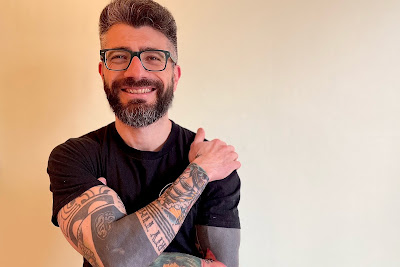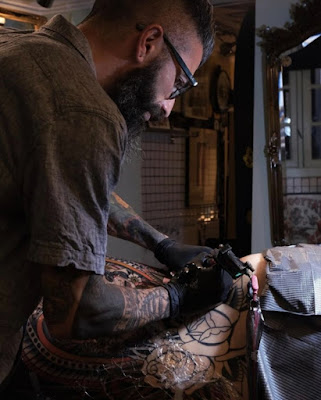Train your mindset. Dealing with anxiety, frustration, perfectionism, and setbacks is what afflicts artists the most, this is why I have a specific section that talks about it in the seminars I teach. It’s vital to make time to understand yourself and how to process negative emotions. As Abraham Lincoln said: ‘Give me six hours to chop down a tree and I will spend the first four sharpening the axe.’
1. Tell us about your background and journey.
I’m originally from Florence, Italy. Growing up surrounded by art I guess played a role in my passion for drawing, something that has always been more of a need since I was little. I fell in love with tattoos and their nonconformism at a young age, they carried a raw expressive power that transcended language as we know it.
Immediately it became an obsession that got me to spend 10 of my 20 years in this field traveling the world to meet artists and foreign cultures. A friend once told me: “the quality of your life is directly proportional to how comfortable you can be outside of your comfort zone”.
This is the reason why I have moved around so much, to develop the mental elasticity, resilience, and understanding that support me today in my various projects and artistic endeavors, such as the charity projects I create with artists from all over the world, podcasting, and teaching.
2. What inspired you to become a tattoo artist?
When I started the world of tattooing was a bit different from what it is today. The craft was still mostly made of outcasts and didn’t benefit from the mainstream popularity that we see now. This means it carried stigma and mystery at the same time, a special charm that separated it from any other art form. It’s hard to put it into words but there is a sort of magic in how we as humans are able to reshape our bodies and perception of ourselves through these decorations.
Tattoos are many different things for many different people. Powerful memento; ritualistic and cathartic experience; connection to your heritage; statement to the world; purely aesthetic ornament; fun experience without the need of deeper meaning. They’re all equally valid and nobody can claim ownership over this art form, I love that. It wonderfully represents the variety of human experience with a powerful language that is both visual and physical.
3. How would you define your aesthetics and style?
I make a point of reminding myself daily that mine is a service industry, meaning that people come first, self-expression after. As tattooers, we must be able to translate every single request that comes through the door in a beautiful and technically well-executed tattoo.
That being said, over time your artistic production inevitably takes a consistent look, which in my specific case can be categorized as ‘American Traditional’. What drove me to this particular style is the simplification of forms and cross-over with folkloric arts which created a unique and powerful language that implies more than it represents. In John Maeda’s words: ‘subtracting the obvious and adding the meaningful.
4. What is the most difficult part of working as a tattoo artist?
Many colleagues will agree that people can be the most wonderful part of this experience and the most challenging. On top of being an artist, you need to be a craftsman and a psychologist, so that you can connect with the customers and give them the best result at that given time.
5. What are common misconceptions among people about tattooing?
Luckily we are over the older misconceptions that associated tattooing with criminal environments and all the discrimination that followed. Today perhaps the most common misunderstanding is to assume that tattooing is what you see on tv shows.
These are highly edited-drama-driven reinterpretations of reality that create a false image in the eye of the viewer. Ego is often placed first in these programs, giving the impression that this job is about fame when it couldn’t be farther from the truth. Same with social media.
In my personal opinion and that of colleagues that have been in the business for a very long time, preserving this beautiful craft and honor the person sitting in front of you should be the priority, the rest is a consequence. Perhaps, rather than thinking of what we can personally get out of it, we can start asking ourselves what we can give back.
6. Who is your favorite tattoo artist and why?
It’s very hard to pinpoint one single person as many artists and friends have my deepest respect for a variety of reasons. If we would have to pick just one tho it has to be Ed Hardy. He’s definitely the most influential tattooer of this century in terms of vision, commitment, and quality. We all owe him for styles that otherwise wouldn’t exist today if not for his efforts in the past.
7. What tips and advice would you give to aspiring tattooists?
I could talk about how to practically improve your technical skills or business but I think those would be more superficial aspects of a bigger picture. I’m quite involved in trying to help younger artists through my social media and seminars and I believe that the best we can do is to help shape a new generation of tattooers that is conscious of the importance of Contribution.
I definitely recommend spending time learning about the roots and history of your craft, it helps develop an appreciation for all that we have today and not give it for granted. Then invest back into tattooing by carefully choosing the artists you support (getting tattooed and buying artworks from them), it’s a great way to learn and create connections. The last thing but possibly the most important: invest in yourself, you’re your best asset. How?
1- Study and practice consistently Drawing and Painting so that you can offer a higher level of quality.
2- Develop and cultivate versatility in all styles of tattooing, thinking that this is all about specialization is a mistake.
3- Train your mindset. Dealing with anxiety, frustration, perfectionism, and setbacks is what afflicts artists the most, this is why I have a specific section that talks about it in the seminars I teach. It’s vital to make time to understand yourself and how to process negative emotions. As Abraham Lincoln said: ‘Give me six hours to chop down a tree and I will spend the first four sharpening the axe.’
8. Which is your favorite book and why?
If I have to pick one book that drastically changed my life for the better would be ‘Letting go- The pathway to surrender’ by David R. Hawkins. Mixing analytical psychology with eastern spirituality, this book gives you the tools to positively process self-sabotaging emotions that are the cause of most of our relationship problems, being social, personal, or professional. It really gave me a new way of thinking and a very constructive perspective on things that I previously struggled with.








.jpeg)


0 Comments